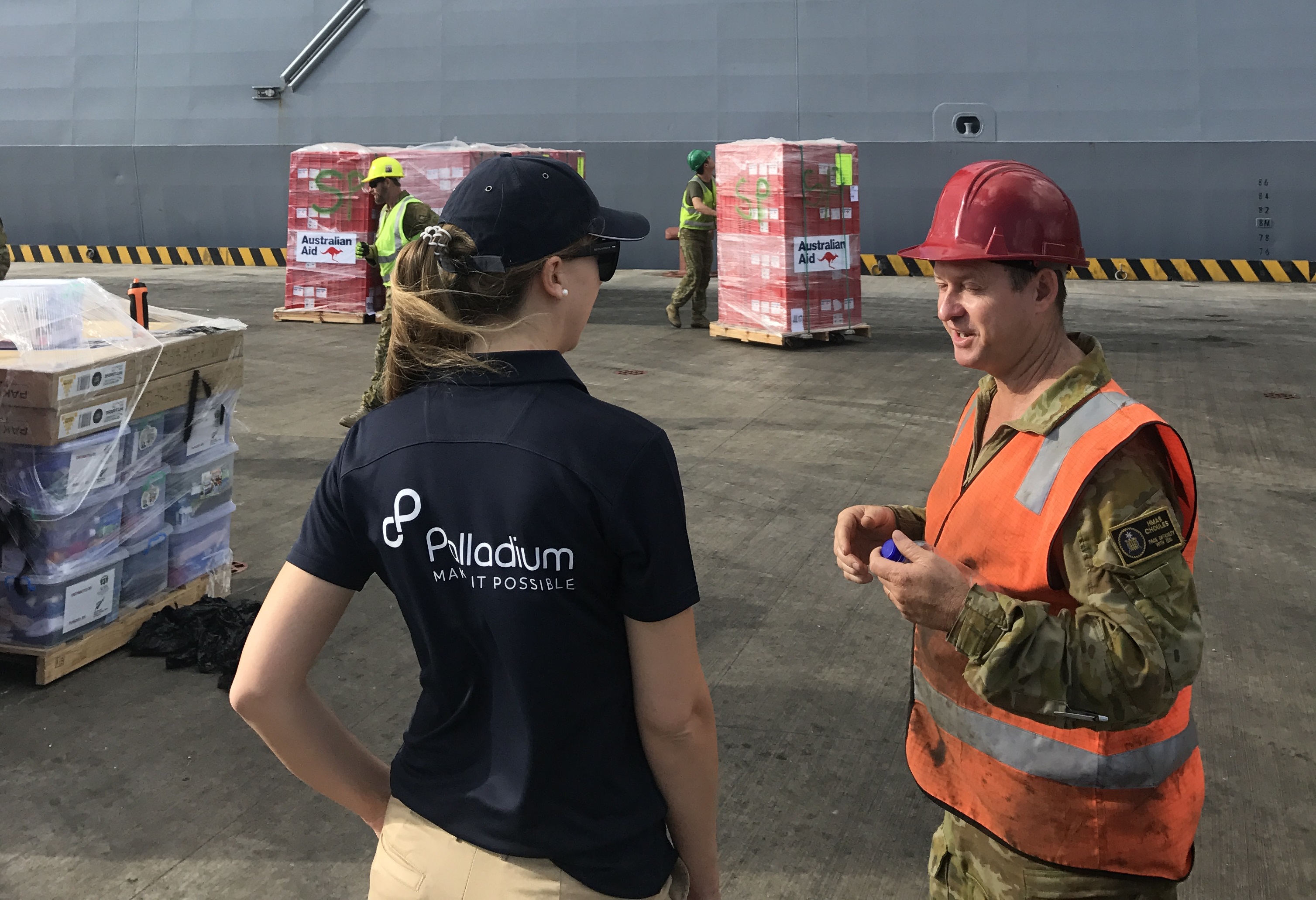with our monthly newsletter.
Our Humanitarian Emergency Response team works with governments, NGOs, and other partners to deliver the fastest post-disaster relief in the world, bringing help to those who need it most in times of crisis. Over the past 20 years, we've learned some interesting things about what makes a good responder, and the qualities we look for might not be what you'd expect.
Would you have what it takes?
1. You Thrive in the Deep End
You may think your office is unpredictable, but many people don’t know how they’d fare in a disaster situation until they’re in one. This line of work means being ‘thrown in the deep end’ and swimming, getting the job done no matter what.
“Past experience isn’t necessarily an indicator of success, as one of our best logisticians was a high school music teacher,” says Matt Everitt, Palladium’s Senior Logistical Support Manager. “In the field, he received incoming cargo, liaising directly with senior Australian and Fiji military.”
“You just have to look for the right personality, and when assembling a team I will ask myself, ‘are they technically competent, and could I share a house with them?’”
2. You Love Change
No matter how much we prepare for every possible emergency, no two crises are alike. Good responders are adaptable, flexible, and reflexive. Disaster situations don’t always allow time for preliminary, in-depth needs assessments, and if a community needs something we haven’t provided, we have to adapt our response to meet the needs on the ground.
“We’re supporting the Australian government and feeding into their system,” Matt describes. “But as new information emerges and we realise we’re focusing on the wrong issues, we have to be willing to change course and help our partners change, too.”
3. If it’s Broke, You’re Already Fixing It
Good responders notice when something is broken, and will always try to fix it, even if it’s not their official responsibility.
“Often when a country is overwhelmed, bottlenecks happen that could prevent our supplies from reaching the people who need them,” says Matt. “When everyone is working long days, focusing on saving lives, and are in an unpredictable setting, we need each person to be on the lookout for problems, big or small. Even the small issues could be the difference between people having what they need, and not.”
“Our responders do all the work that needs to be done, and if they ever find themselves in a lull, they find something to do. No one is above making tea or sandwiches for a tired team. Simply put, these are natural problem solving people.”

4. You’re Not Always One of the Guys
Humanitarian emergency responders have historically been men, but women responders are critical to connecting with the most important beneficiaries in a disaster: other women.
“In many contexts and cultures where we work, it would be inappropriate for local women to deal with unfamiliar men,” Matt explains. “Women are often responsible for the core people and needs in a disaster situation – they are the ones primarily caring for children, the vulnerable, and responsible for preparing shelter and sanitation and hygiene needs. These women have the best knowledge of what the majority of beneficiaries need. If our team is male only, then we are cutting ourselves off from the most critical people we are trying to serve.”
5. You’re Actually a Team Player
No one individual or organisation can do this work alone. The team is constantly communicating with host governments, local organisations, NGOs, international agencies like the United Nations, and other countries to coordinate plans, supplies, and timelines, and to ensure that there are no duplications or inefficiencies. There’s no time to waste, multiple moving parts, and all decisions need to be made with group knowledge.
Matt shares the example of one responder in the Solomon Islands: “He returned to train communities on basic logistics and how to assemble special storage tents, so when the next disaster hits, they won’t need to wait on us for technical support. We do this wherever we go, upskilling local capabilities. This work is too important to risk because someone wants to be a hero. A good responder takes the initiative to actively work with others to get the job done to the highest standards.”
Palladium has been providing logistical support for the Australian Government’s humanitarian relief efforts since 1987 including responding on the ground to some of the biggest disasters in the Pacific. Contact Matt Everitt for more information.
with our monthly newsletter.
